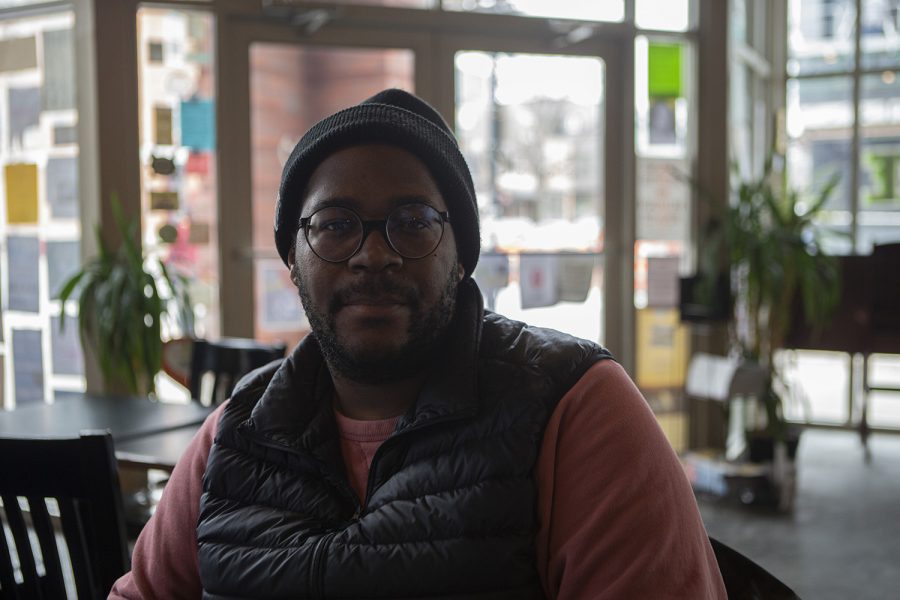Brandon Taylor reads from novel Real Life at Prairie Lights
Brandon Taylor, an Iowa Writers Workshop graduate, debuted his novel Real Life at Prairie Lights on Wednesday night.
Jake Maish for The Daily Iowan
Iowa Writers’ Workshop graduate Brandon Taylor poses for a portrait during an interview with The Daily Iowan about his debut novel “Real Life” in High Ground Cafe on Wednesday, Feb. 19, 2020.
February 19, 2020
The anticipation of Brandon Taylor’s debut novel filled the second floor of Prairie Lights on Wednesday night. The audience members sipped on wine or coffee, awaiting Taylor’s introduction of Real Life.
Originally from Alabama, or in his own words during the discussion, “deeply from Alabama,” Taylor ventured into the Midwest for grad school in Madison, Wisconsin, and was later accepted into the Writers Workshop at Iowa.
“Writing a novel turns you into the person you need to be to finish it,” Taylor said after telling the story of how his novel came to be. However, he does not consider himself a novelist. In fact, he told the Prairie Lights audience that he only wrote the novel to get an agent to take his short stories seriously.
“I’ve been in school or college since I was four years old, and so I’ve spent so much of my life on campuses,” Brandon Taylor said in an interview with The Daily Iowan before the reading. “When I was thinking about the kind of story I wanted to tell, it seemed natural to write a campus novel. Except for this time, the protagonist is a queer black person because often times in campus novels, they follow straight white people around.”
Given his background in biochemistry, Taylor said that Real Life was born from a very regimented and systematic approach. According to Taylor, the systematic nature of his writing “takes the romanticism out of writing.” He also added that he had never been a romantic person, to begin with.
“The world has sensuous poetry about it, but also a sensuous observation to it,” Taylor said, intertwining his two worlds of science and literature.
Real Life is partially autobiographical because it incorporates experiences Taylor has had in his own life, but the main character, Wallace, is not him. Wallace reacts to situations in ways that Taylor would never, and vice versa. The story spans over one emotionally charged weekend in which he recently lost his father, failed his experiment with the nematodes, and tries to grapple with life in a town where he feels he does not belong.
Writing the novel was not cathartic, according to Taylor, but it was a way to revisit some of the pivotal points of his life by writing what could have happened instead.
“It was harder to really dig deep and revisit the more difficult parts of my past. The more autobiographical part of the novel is actually a lot of the more vile, racist, or classist things that the protagonist encounters,” he said. “Overall, I found drawing on personal experience really artistically invigorating and enriching.”
When he was in undergrad and feeling low, Taylor said his friends would bring him to a bookstore, Books a Million, to cheer him up. He would go to the front counter to ask the checkout person for various gay books, to which the cashier would respond, “We don’t sell those here, this is a family store.”
“It felt like I was being told again and again that stories about people like me and my friends, also queer black men, that stories about us weren’t permissible,” Taylor said. “It was really painful for me. Writing this novel felt like pushing back against the idea that our lives weren’t the subject of art.”
“I wasn’t aware you could live in America without seeing a black person until living in Madison because I never saw a black person,” Taylor said with a laugh during the reading.
Taylor hopes that readers will be left a bit uncomfortable once they put the novel down, but also hopes they will also have a pleasurable reading experience about what it is like to be young and confused about what they’re going to do with life.
“I hope that it’s a novel that challenges people to think about the ways that we fit together in our relationships with one another. I hope it makes people think really deeply about both the ways that they are harmed, and that they do harm to others.”



